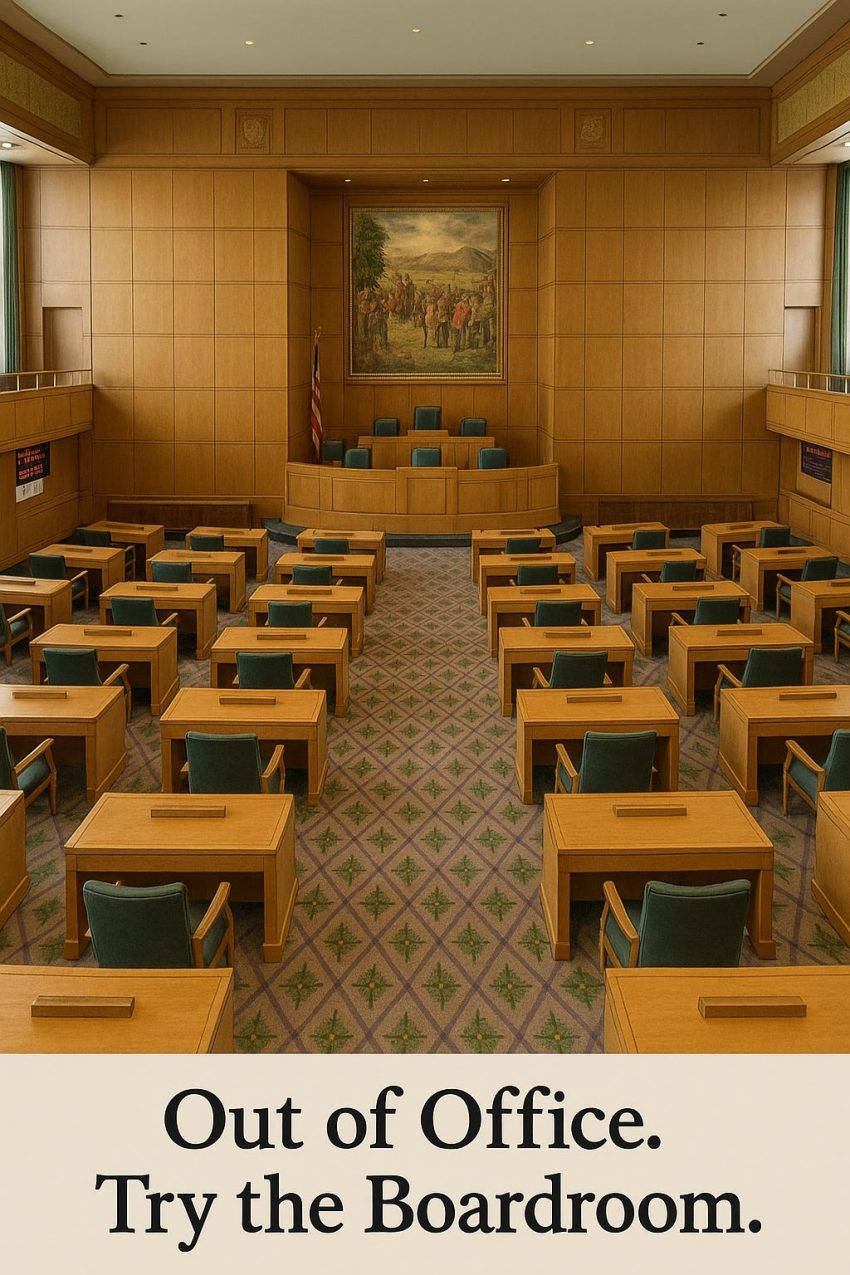 EDITOR’S NOTE: Here’s an installment from Tillamook County’s State Representative Cyrus Javadi’s Substack blog, “A Point of Personal Privilege” Oregon legislator and local dentist. Representing District 32, a focus on practical policies and community well-being. This space offers insights on state issues, reflections on leadership, and stories from the Oregon coast, fostering thoughtful dialogue. Posted on Substack, 5/6/25
EDITOR’S NOTE: Here’s an installment from Tillamook County’s State Representative Cyrus Javadi’s Substack blog, “A Point of Personal Privilege” Oregon legislator and local dentist. Representing District 32, a focus on practical policies and community well-being. This space offers insights on state issues, reflections on leadership, and stories from the Oregon coast, fostering thoughtful dialogue. Posted on Substack, 5/6/25
Why lawmakers keep dodging responsibility—and why it’s costing us
By State Representative Cyrus Javadi, District 32
Let’s start with a confession: A lot of government these days doesn’t happen where you think it does. It’s not in the hearing rooms or the floor debates or the campaign ads. It’s in quiet meetings of small boards with big mandates. And while their names sound administrative—Forestry, Labor, Health—they’re increasingly where the real decisions get made.
On paper, boards are supposed to be helpful. Advisory. Technical. Focused. But more and more, they’re being handed power that looks an awful lot like legislation: the authority to write binding rules, control public resources, and reshape entire sectors of Oregon’s economy. They meet quietly, often during business hours. Their hearings are rarely televised. Most Oregonians wouldn’t recognize their names, let alone know how to weigh in. And yet, what they decide can carry the force of law.
That might sound like a minor procedural concern—until you look at the scale. As of 2024, Oregon had over 300 active boards and commissions. From 2019 to 2023, the Legislature introduced more than 7,500 bills. About 1,500 became law. In that same window, at least 15 new boards or task forces were created. That’s one board for every 100 laws. And each one is its own quiet channel of policymaking, operating under the banner of expertise and efficiency.
But expertise isn’t the same thing as legitimacy. And efficiency, while great for pizza delivery, isn’t the standard we should be applying to representative government.
Seven People, 70 Years, and Half a Million Acres
Consider the Oregon Board of Forestry. Just seven members. Appointed, not elected. And yet this board recently adopted the Habitat Conservation Plan—a sweeping set of restrictions on how public forestland will be managed for the next 70 years.
Yes, 70 years.
The plan affects over 640,000 acres of state forest. It reshapes timber harvest levels, conservation zones, and economic expectations for entire rural communities. It’s not a vague guideline. It’s a legal framework with real-world consequences: job losses, revenue shortfalls for schools and counties, and tighter restrictions on forest use for generations.
The HCP has plenty of supporters—mostly from environmental groups that have pushed for more preservation. But whether you support the plan or not, the process should give you pause. Because this wasn’t the result of a full legislative debate. No floor vote. No series of amendments hammered out in public. No roll call for constituents to study. Just a board meeting. Seven votes. Done.
This isn’t how most people think public policy gets made. But it’s increasingly how the biggest decisions happen.
Outsourcing Democracy, One Bill at a Time
Then there’s HB 3838, which at least has the decency to admit it’s creating a board from scratch.
The bill proposes a 13-member Caregiver Workforce Standards Board. Its charge? Set wages, benefits, and working conditions for caregivers across the state. Now, improving pay and standards for caregiving jobs is a perfectly worthy goal. But instead of passing a law that outlines clear standards and funding mechanisms—like legislatures used to do—HB 3838 hands the whole thing off to a brand-new board.
This board will have subpoena power. Rulemaking authority. It will set the economic terms for a key slice of the labor force, and it will do so with only indirect accountability to the public.
What does “indirect accountability” mean in practice? It means when the board issues a policy that strains small care providers, or sets wage floors that conflict with Medicaid reimbursement rates, or creates compliance burdens that rural communities can’t meet—no one has to take a vote. Lawmakers can say, “That wasn’t us.” And voters are left trying to figure out who to call.
The Babysitter Test: Delegation Gone Too Far
So let’s be honest. When we say, “Let’s create a board,” what we’re often saying is, “Let’s not deal with this ourselves.”
That’s not leadership. That’s abdication.
It’s a bit like hiring a babysitter and saying, “You raise the kids.” Not just “Can you help with dinner and bedtime?” but “You decide what they eat, what rules they follow, when they go to sleep—and what to do if they try lighting something on fire.”
And then, when things inevitably go sideways—when bedtime turns into midnight meltdowns and dinner is six packs of fruit snacks—you say, “That’s not what I meant.”
But of course, it is. You didn’t give instructions. You gave authority.
That’s what we’re doing when we delegate major policy to unelected boards. We’re not asking for help—we’re handing over the job. And once it’s out of our hands, the public can’t vote their way back into the conversation.
The result? A creeping sense of distance. Decisions still get made—but they happen in boardrooms instead of chambers. And the people left most affected by those decisions rarely know who to hold accountable.
When We Still Knew How to Govern
None of this is to say that legislation doesn’t work. When we get it right—when we embrace the full weight of our responsibility instead of outsourcing it—democracy delivers.
Take the Civil Rights Act of 1964. It wasn’t created by a commission. It wasn’t quietly drafted by a panel of experts and slipped into the rulebook. It was a fight. It took months of public hearings, debates that stretched into the night, and a filibuster that lasted over two months in the U.S. Senate.
The bill sparked outrage. It forced people to take sides. Lawmakers were flooded with letters and phone calls. The press covered every twist and turn. But through it all, Congress kept at it. They argued, they negotiated, and in the end, they voted—on the record.
And that vote changed everything.
The Civil Rights Act didn’t just outlaw discrimination. It showed the country—especially those being discriminated against—that the government could be used to right wrongs. That if enough people stood up and stayed in the room, the process could bend toward justice.
Was it uncomfortable? Absolutely. Was it messy, inefficient, and politically dangerous? No question.
But it was also one of the clearest examples in modern history of why representative government matters. Not because it’s fast. Not because it’s clean. But because it’s public. Because it forces elected officials to grapple with real issues in full view of the people they represent—and to own the outcome.
That’s the job. And when we do it with courage, it works.
Abdication Is a Bipartisan Tradition
And yet, we keep delegating. We keep handing over authority, like parents who’d rather not enforce bedtime because the sitter is “handling it.” Why?
Because it’s easier. Cleaner. Less likely to end in tears—ours or someone else’s.
Delegating is politically comfortable. Lawmakers can tell their constituents they’ve “taken action,” while avoiding the hard work of hammering out details or taking potentially unpopular votes. If the board succeeds, we all cheer and move on. If it stumbles, we point fingers from a safe distance. “That board went too far,” we say. Or: “We didn’t anticipate that consequence.”
It’s risk management masquerading as good governance.
And it’s bipartisan. Democrats create boards to pursue regulatory goals they don’t want to negotiate in public. Republicans do it when they want the credit for tackling a problem but not the blowback from a tough compromise. Everyone gets to look busy. No one has to own the outcome.
The Disappearing Act of Accountability
An even deeper problem here isn’t the number of boards—it’s the erosion of public responsibility.
Boards blur the line between advisory input and actual lawmaking. They make decisions with massive consequences, often without the same public visibility or political accountability that’s supposed to come with representative government. When things go wrong, there’s no campaign to vote them out. No debate to rewind. No elected official standing in front of their community saying, “Yes, I voted for that.”
We used to call that dodging the job.
Now we call it process.
And while a board here or there might seem harmless, the cumulative effect is serious. The more we normalize policymaking by appointment, the more we detach government from the public it serves. The harder it becomes for working people to follow what’s going on. And the easier it becomes for well-organized interests to dominate the conversation.
The more we hand off responsibility, the more we become like the absent parent who’s surprised when things go wrong—despite giving someone else the keys and walking out the door.
The Hard Way Is the Right Way
We should get back to legislating. Not because it’s elegant—it isn’t. Legislating is messy, slow, and deeply uncomfortable. It involves public hearings, clunky compromises, and floor speeches that sometimes go nowhere. But it also involves votes. On the record. In front of the people. And that’s the point.
If the state wants to raise wages for caregivers, the legislature should write a law. Debate it. Spell out the costs. Show the trade-offs. If Oregon wants to radically reshape forest policy, let the Legislature take it up. Let people testify. Let lawmakers own their positions.
Boards can help with implementation. They can advise. They can even propose. But they shouldn’t be used to bypass the most basic job of elected government: making decisions in the open, for everyone to see.
In Conclusion: Democracy Is a Chore
Democracy was never designed to be efficient. It was designed to be accountable. It’s a slow, deliberate system that requires elected officials to stand up, take positions, and live with the consequences. That’s not always fun. But it’s necessary.
If we hand off every tough question to a board, we might gain efficiency—but we lose clarity, trust, and public engagement. And once that happens, the whole system suffers.
We weren’t elected to be babysitters—or to hire them and leave the house. We were elected to stay in the room, make the tough calls, and answer for them. If that’s uncomfortable, that’s the point. Because when the public starts asking, “Who’s in charge here?”—they should never have to guess.
They should already know.


